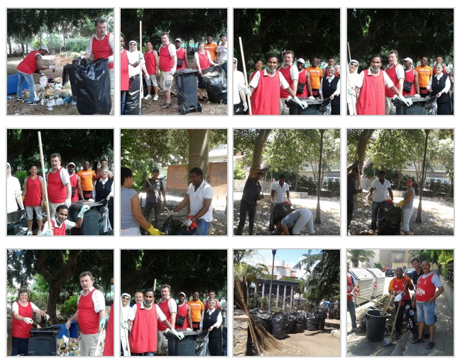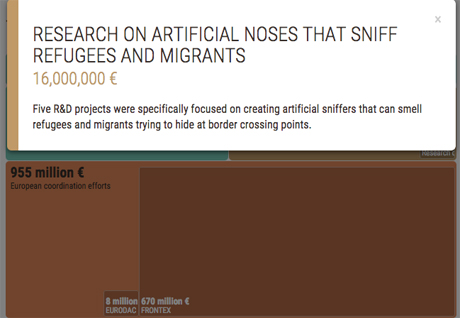
Since the beginning of 2015, more than 54,000 migrants have fled Africa and embarked in a journey of hope toward the shores of Italy – often, with deadly outcomes.
While the country is floundering to welcome such an unexpectedly huge number of people, the topic of immigration has risen atop the political agenda, triggering a heated debate on immigrants and migration policies that has rapidly spread across the continent.
Now Italian not-for-profit project Migranti is trying to shed new light on the lives and personal pathways of the refugees, in a bid to tackle racism and intolerance in the country. Devised by the team from Italian über-blog Valigia Blu, Migranti is a crowdsourced platform which collects and publishes positive stories of integration and solidarity.Everyone has the opportunity to take the poison out of this current climateArianna Ciccone, Valiglia Blu
Anyone can contribute to the project by sending their own articles, photographs and videos, or signaling a meaningful story that has already been published elsewhere.
Through this developing aggregation of original and existing material, Migranti aims to build a new narrative on the topic of immigration, far from the gloomy diktat put forth by many in legacy media. The side of the story told by Migranti, in fact, goes beyond the stereotypes widespread throughout some parts of the Italian public opinion.
"The way Italy is talking about this issue at the moment is very harmful," explained Arianna Ciccone, editor of Valigia Blu and director of the International Journalism Festival in Perugia, who conceived the project. "The debate is distorted, and this distortion is fed by media and politicians.
"It’s like we are only seeing the bad side of the situation, not the whole picture. Yet I think that every citizen has the opportunity and the responsibility to take the poison out of this current climate through their online actions: on the web and on social networks."

Migrants to Reggio help clean up the city as a gesture of thanks (Screenshot of gallery from StrettoWeb)
Stories include a map showing which Italian monasteries opened their doors to refugees from religious site Altro di Dare (More to Say); an article from Stretto Web about immigrants who help clean up roads in Reggio after landing there (above); an interview with a philosophy professor who sheltered six African refugees in his house in Treviso from HuffPost Italy; or the story of the Black Scorpions from Umbria24, a football team formed by young immigrants from Senegal and Gambia.
The Migranti team is handpicking and fact-checking the stories coming from readers; at the moment the contents are sorted based on their relevance.
Stories can also be browsed geographically through a map built with StoryMap JS, a free tool developed by the Knight Lab of the Northwestern University. In the next few days, the team will start publishing journalistic reportage of their own in an effort to add verified context to the crowdsourcing process.
In its first week, Migranti gathered more than 100 stories, sent by readers through Facebook, Twitter, or via e-mail and that community, Ciccone explained, is the driving force of the project. Speaking to Journalism.co.uk, she argued that "the engagement of audiences is the first step to rethink a working business model for news."
That’s not Migranti’s case, since the project doesn’t seek profit, "but newspapers, especially local ones, must become indispensable to their readers. If they do, they could profit from it," Ciccone said.We see migration not as a matter for individual countries, but rather as a European issue that should be discussed and addressed from a European perspectiveJacopo Ottaviani, The Migrant Files
But Valigia Blu’s Migranti isn’t the only interesting european project about migrants that’s worth a look at the moment.
If embarkations are making headlines, so are shipwrecks. In April alone, five boats capsized in the middle of the Mediterranean Sea causing the death of an estimated 1,200 people.
These calculations are the core of award-winning The Migrants Files, an in-depth, pan-european data journalism project aimed at counting immigrants’ deaths along all the continental borders over the last 15 years.
Its second chapter, released in June and accompanied by a new website, is focussed on the economic side of immigration. The team, comprising 15 European data journalists, analysed the expenses – both on a national and a continental level – to counter and deport the immigrants considered 'irregular', also estimating the amount of money spent by migrants to get into Europe.
"A huge business emerges," data journalist Jacopo Ottaviani told Journalism.co.uk. "Even though our estimations are 'lower bounds', we counted €13bn (£9.2bn) spent by Europe to counter immigration and €16bn (£11.4bn) paid to smugglers by migrants."

Screenshot from TheMigrantFiles.com
All the numbers and the datasets published on The Migrants Files were released in open format, to let other journalists, activists and citizens explore and re-use them. The team also released a methodological note to clarify how they calculated the figures.
"It's not trivial to manage a team of twelve journalists from all over Europe – speaking different languages, working in diverse cultural contexts and operating from various time zones," Ottaviani said. "However, the use of collaborative tools such as Google Drive, Doodle and Trello facilitated coordination and co-operation."
Similarly to Valigia Blu’s Migranti, The Migrants Files – partially funded by journalismfund.eu and coordinated by Journalism++ – aims to influence the public opinion and the decisional process of governments and institutions.
"We believe all this helps to improve the quality of journalism in Europe. We also see immigration not as a matter for individual countries, but rather as a European issue that should be discussed and addressed from a European perspective," Ottaviani said.
Free daily newsletter
If you like our news and feature articles, you can sign up to receive our free daily (Mon-Fri) email newsletter (mobile friendly).









